Discover folk - the CRM for people-powered businesses
When you're scaling a team, managing customer relationships becomes both more critical and more complex. You need a CRM that can handle multiple users, streamline collaboration, and grow with your expanding operations—without overwhelming your budget or requiring extensive training.
That's where the right sales stack becomes essential, starting with a CRM designed for growing teams. In this post, we'll explore the best CRMs for startups, highlighting solutions that balance powerful features with ease of use and team collaboration capabilities.
Why Startups Need a CRM in 2026?
Startups don’t lose deals because the product is bad. They lose deals because the process is chaotic. In 2026, buyers expect sharp follow-ups, clear ownership, and zero friction. When a founder is juggling demos, fundraising, hiring, and product, a CRM becomes the only place where the commercial reality stays readable.
A CRM also protects a startup from “memory-based selling.” The second a team grows beyond one person, information fragments: who spoke to whom, what was promised, which stakeholder matters, why a deal stalled. A CRM turns that into shared context, so handoffs don’t kill momentum and nobody has to reinvent the story every week.
Finally, a CRM forces focus. It makes it obvious what’s real (active opportunities), what’s noise (low-intent leads), and what’s urgent (deals that need next steps). That visibility is what allows startups to iterate their GTM fast, tighten messaging, and build a pipeline that survives beyond the founder.
✔️ Less pipeline chaos: A single source of truth for leads, accounts, stages, and next steps—no more hunting across tools.
✔️ Cleaner handoffs as the team grows: When sales, founders, and marketing touch the same accounts, shared notes and history prevent dropped balls.
✔️ Stronger multi-stakeholder selling: Track champions, blockers, and decision-makers per account to stop losing deals to invisible committees.
✔️ More predictable follow-up discipline: Reminders and task flows keep momentum when the team is stretched thin.
✔️ Faster GTM learning loop: Seeing patterns (what converts, what stalls, why) helps refine targeting and messaging quickly.
✔️ Better revenue visibility for decisions: A realistic view of pipeline value and close likelihood supports hiring, budgeting, and runway planning.
The 5 best CRMs for Startups in 2026
👉🏼 Try folk now to compare folk against other top free CRMs for startups and unify your team's outreach
1. folk
⭐⭐⭐⭐⭐(G2)
folk offers a generous 14-day free trial and team-friendly pricing that scales with growing organizations.
folk is specifically designed for growing teams that need powerful CRM capabilities without enterprise complexity. It excels at team collaboration, workflow automation, and seamless scaling for organizations.

Key features
- Bulk contact enrichment: Automatically enriches contact databases at scale, finding emails and LinkedIn profiles for entire prospect lists, perfect for teams managing thousands of contacts efficiently.
- Advanced LinkedIn integration: Coordinate LinkedIn outreach across team members, track team-wide conversations, and share connection strategies for maximum network leverage.
- Team email management: Comprehensive email coordination features with shared templates, team sequence management, and unified tracking across all team communications.
- Collaborative AI features: AI-powered tools help teams coordinate activities, automate routine tasks, and provide insights that improve team-wide performance and efficiency.
- Enterprise integrations: folk integrates with over 6,000 apps including team productivity tools, allowing medium-sized teams to maintain their existing workflows while centralizing customer data.
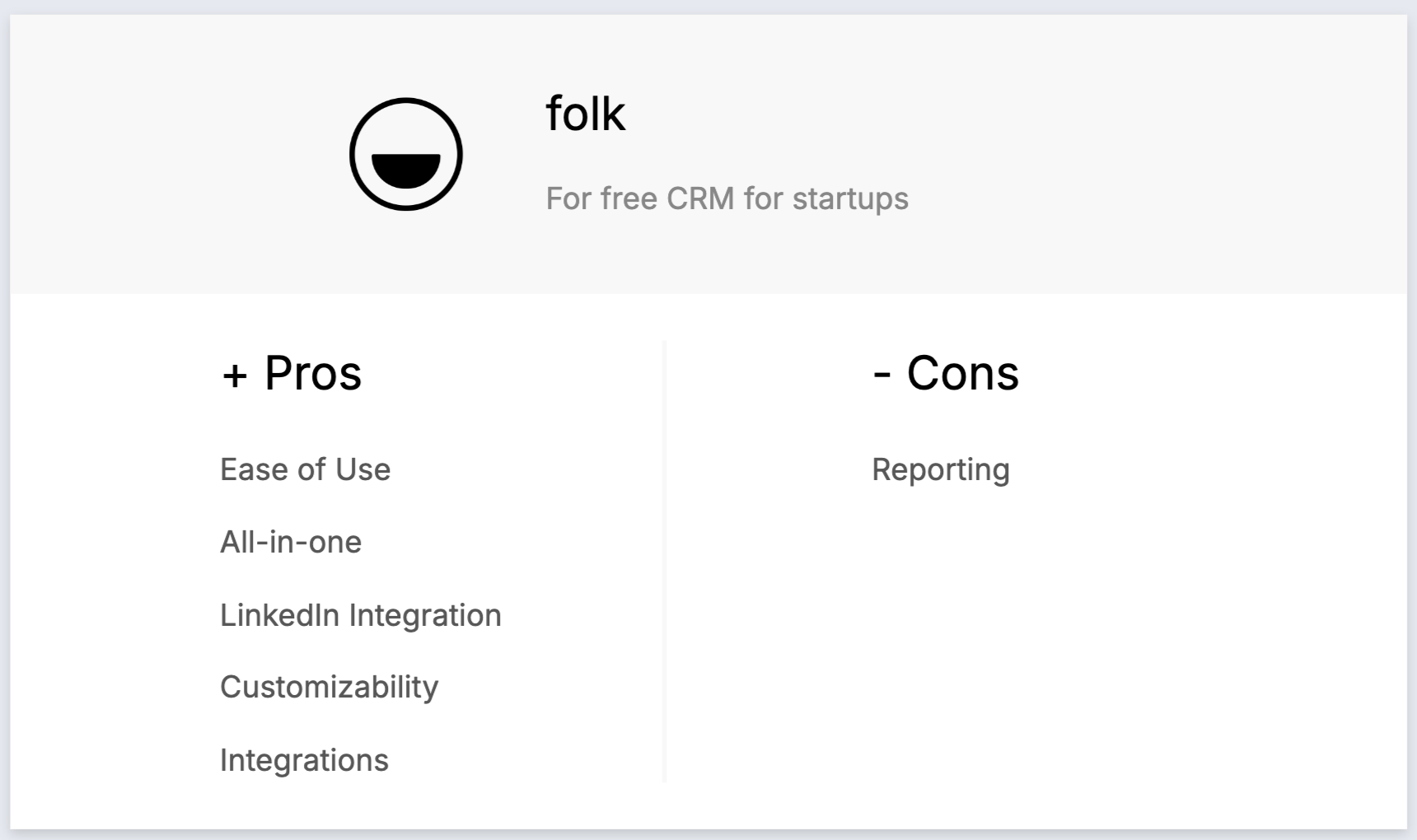
Pros
- Team-focused design: Built specifically for growing teams with intuitive collaboration features that require minimal training, allowing teams of 20-50 people to get productive quickly.
- Unified workflow platform: Combines LinkedIn prospecting, email outreach, contact management, and pipeline tracking in one platform, eliminating the need for multiple tools and reducing complexity for medium-sized teams.
- Scalable team coordination: Advanced collaboration features enable seamless handoffs, shared pipeline management, and coordinated outreach campaigns across multiple team members.
- Flexible customization: Highly customizable fields, pipelines, and workflows that can adapt to different team structures and business models without requiring technical expertise.
- Comprehensive integrations: Connects with over 6,000 business applications, allowing teams to maintain their preferred tool stack while centralizing customer relationship management.
Cons
- Advanced analytics included: folk provides pipeline and deal stage analytics, revenue forecasting with weighted probabilities, and performance breakdowns by owner, channel, industry, region, or any custom field, plus revenue insights and segmentation.
Price and plans
folk's pricing is particularly attractive for teams, with volume advantages and a comprehensive 14-day trial.
- Standard: $17 per user, per month (significant savings at 20+ users)
- Premium: $33 per user, per month (recommended for teams needing advanced features)
- Custom: Starts from $67 per user, per month (tailored for specific team requirements)
2. HubSpot
⭐⭐⭐⭐(G2)
HubSpot offers a free plan but paid features become expensive.
Hubspot CRM provides integrated marketing, sales, and service tools, though the pricing can become prohibitive for medium-sized teams needing advanced features across multiple users.

Key features
- Marketing Hub: Includes email marketing, ad tracking, landing pages, and lead generation tools suitable for teams with dedicated marketing roles.
- Sales Hub: Provides deal tracking, pipeline management, sales automation, and reporting capabilities designed for sales team coordination.
- Service Hub: Offers customer service tools like ticketing, live chat, and knowledge bases for teams managing ongoing customer relationships.
- Lead scoring: Advanced lead qualification features help teams prioritize efforts and allocate resources effectively.
- Operations Hub: Syncs and automates business processes across different systems, supporting complex team workflows and integrations.
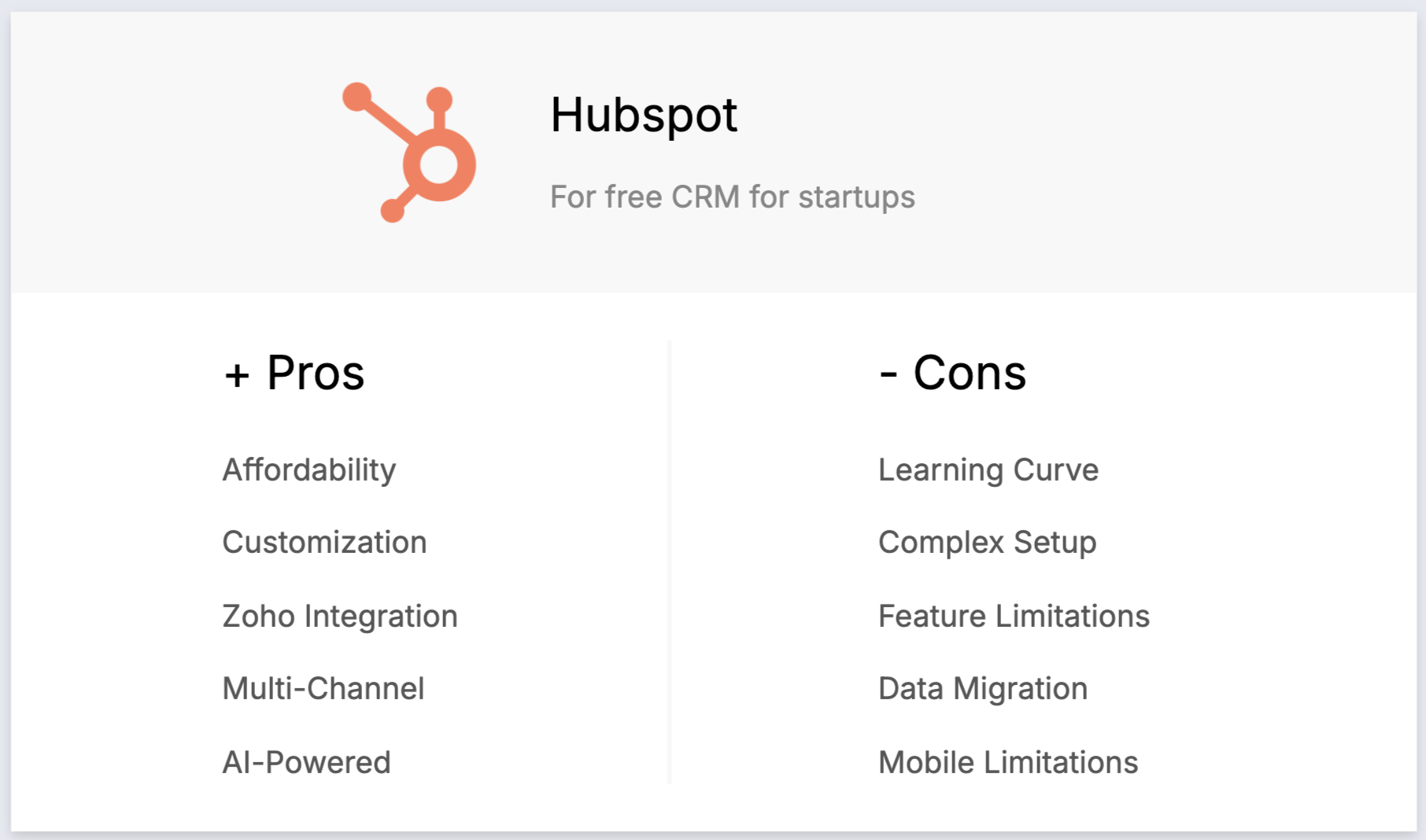
Pros
- Comprehensive platform: All-in-one solution covering marketing, sales, and service functions that larger teams often need under one roof.
- Robust free tier: Generous free plan that can work for basic needs, though teams typically outgrow it quickly as they scale.
- Strong integration ecosystem: Extensive third-party integrations and a mature platform that works well with existing business tools.
- Advanced automation: Sophisticated workflow automation capabilities that can handle complex team processes and multi-step campaigns.
- Educational resources: HubSpot Academy provides extensive training materials that can help teams maximize platform usage.
Cons
- Expensive for medium teams: Costs escalate quickly for teams, especially when multiple hubs are needed, often reaching $9,000-22,500 per month for Professional tier.
- Limited customization in lower tiers: Many customization features are locked behind expensive plans, limiting flexibility for growing teams on budgets.
- Complex feature management: The platform can become overwhelming to manage across medium-sized teams, requiring dedicated administrators.
- Email limitations: Email marketing restrictions can be problematic for teams with larger prospect databases or frequent communication needs.
- Steep learning curve: Advanced features require significant training investment, which can be challenging for busy growing teams.
Price and plans
HubSpot's pricing becomes expensive quickly for teams requiring advanced features.
- Starter: $15 per user, per month (limited features for teams).
- Professional: $450 per user, per month ($9,000-22,500 monthly for teams of 20-50).
- Enterprise: $1,500 per user, per month ($30,000-75,000 monthly for teams of 20-50).
3. Zoho
⭐⭐⭐(G2)
Zoho's plans can accommodate teams but require significant customization and setup time.
Zoho CRM offers extensive customization options and comprehensive features, though teams often find the complexity challenging to manage effectively across users without dedicated IT support.

Key features
- Advanced customization: Extensive customization capabilities for teams needing highly specific workflows and data structures across multiple departments.
- Multi-departmental management: Manages complex team structures with different roles, permissions, and workflows suitable for diverse 20-50 person organizations.
- Comprehensive communication tools: Integrates email, phone, social media, and live chat for teams managing diverse customer touchpoints.
- Advanced analytics: Detailed reporting and dashboard capabilities for managers overseeing multiple team members and complex sales processes.
- Workflow automation: Sophisticated automation options for teams needing complex, multi-step processes involving multiple team members and departments.
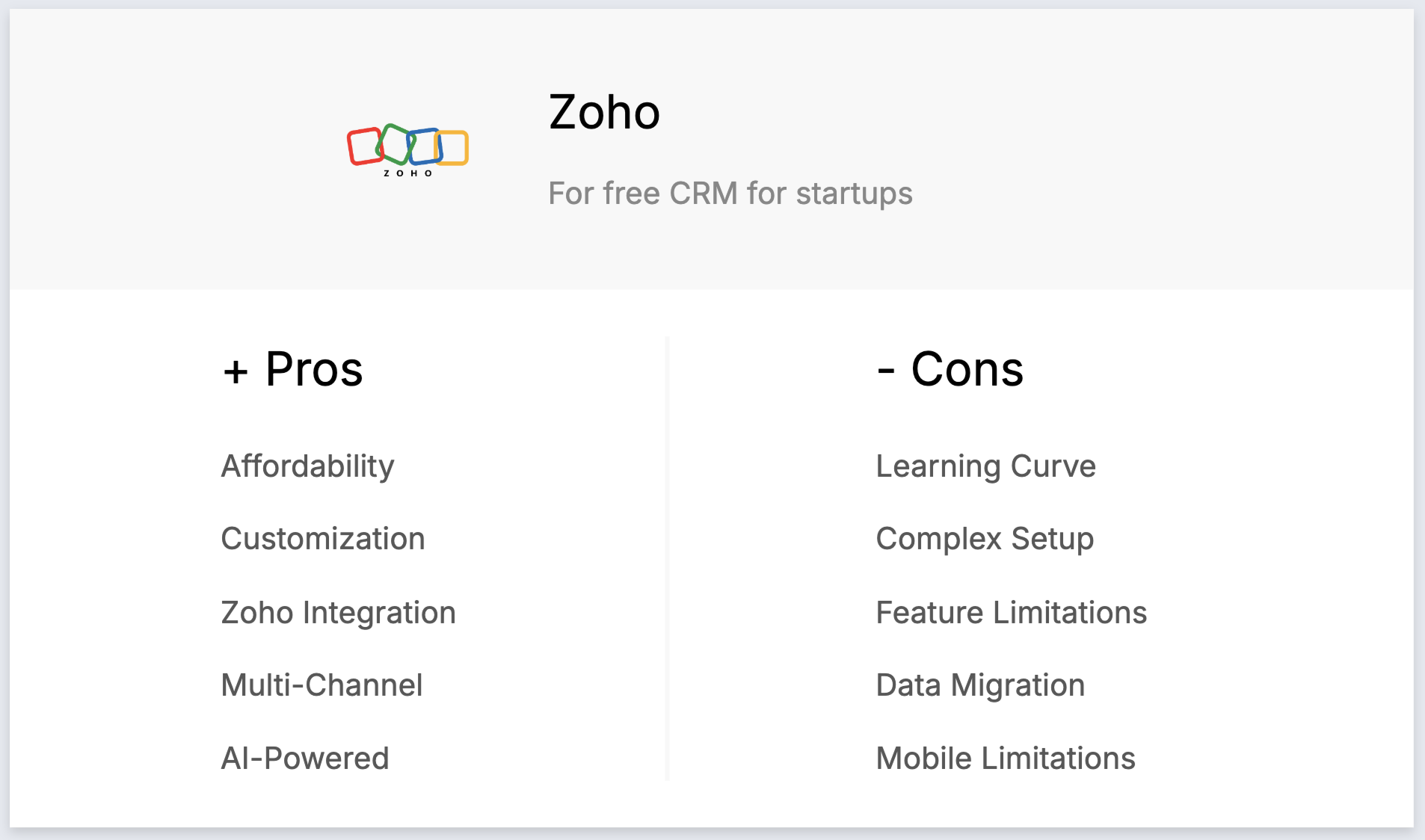
Pros
- Cost-effective scaling: Reasonable per-user pricing that remains manageable as teams grow, with good volume pricing options.
- Extensive customization: Highly customizable platform that can adapt to complex team structures and unique business processes without additional development.
- Zoho ecosystem integration: Seamless integration with other Zoho business applications, creating a comprehensive business management suite for growing teams.
- Multi-channel team coordination: Strong support for coordinating customer interactions across different channels and team members.
- AI-powered insights: Zia AI assistant provides intelligent insights and suggestions that help teams optimize their processes and improve performance.
Cons
- Complex setup and management: Extensive customization options require significant time investment and often technical expertise to implement effectively across medium-sized teams.
- Steep learning curve: The platform's complexity can overwhelm team members, requiring extensive training and potentially reducing adoption rates.
- Advanced features in higher tiers: Many features essential for teams of 20-50 people are only available in more expensive plans, increasing total cost of ownership.
- Data migration complexity: Moving existing team data into Zoho can be challenging and time-consuming, often requiring professional services for larger teams.
- Mobile limitations: The mobile experience doesn't match the desktop functionality, which can be problematic for teams with mobile workers or field sales representatives.
Price and plans
Zoho offers reasonable pricing for teams, though advanced features require higher-tier plans.
- Standard: $20 per user, per month ($400-1,000 monthly for teams of 20-50)
- Professional: $35 per user, per month ($700-1,750 monthly for teams of 20-50)
- Enterprise: $50 per user, per month ($1,000-2,500 monthly for teams of 20-50)
4. Pipedrive
⭐⭐⭐⭐(G2)
Pipedrive offers a 14-day free trial and team-focused features, though it can become expensive for larger teams needing advanced capabilities.
Pipedrive focuses on sales pipeline management with visual workflows, though teams often find they need additional tools to handle marketing and customer success functions effectively.

Key features
- Visual pipeline management: Intuitive pipeline visualization that works well for teams coordinating deals and opportunities across multiple sales representatives.
- Team sales automation: Workflow automation designed for sales teams, including lead routing, follow-up scheduling, and task assignment across team members.
- Email integration and tracking: Comprehensive email management with team templates and tracking, though integration capabilities are more limited than some alternatives.
- Team performance analytics: Sales-focused reporting and analytics that help managers track team performance and individual contributor success.
- Customizable team workflows: Flexible pipeline and field customization options that can adapt to different team structures and sales processes.

Pros
- Sales team focus: Specifically designed for sales teams with intuitive pipeline management that teams can adopt quickly.
- Visual workflow management: Clear, visual approach to pipeline management that helps teams coordinate deals and track progress effectively.
- Good team customization: Reasonable customization options that allow teams to adapt the platform to their specific sales processes without excessive complexity.
- Automation for sales teams: Solid automation features focused on sales workflows, helping teams manage repetitive tasks and coordinate handoffs.
- Team collaboration features: Good support for team-based selling with shared deals, activity tracking, and performance visibility across team members.
Cons
- Limited beyond sales: Lacks comprehensive marketing automation and customer success features that growing teams typically need as they mature.
- Basic reporting for larger teams: Reporting capabilities in lower tiers are insufficient for managing and analyzing performance across team members effectively.
- No built-in email marketing: Teams need separate email marketing tools, adding complexity and cost to the overall tech stack.
- Customization limitations: Advanced customization options are more limited compared to other platforms, potentially restricting growing teams with complex needs.
- Scaling costs: Pricing becomes expensive for teams, especially when advanced features and reporting are needed.
Price and plans
Pipedrive's pricing for teams can become substantial, especially for advanced features.
- Essential plan: $24 per user, per month ($480-1,200 monthly for teams of 20-50).
- Advanced plan: $44 per user, per month ($880-2,200 monthly for teams of 20-50).
- Power plan: $79 per user, per month ($1,580-3,950 monthly for teams of 20-50).
- Enterprise plan: $129 per user, per month ($2,580-6,450 monthly for teams of 20-50).
5. Capsule CRM
⭐⭐⭐⭐(G2)
Capsule CRM can work for smaller teams, but may lack advanced features needed for larger team coordination.
Capsule CRM offers a straightforward approach to customer relationship management, though teams often find they need more sophisticated collaboration and automation features as they scale.
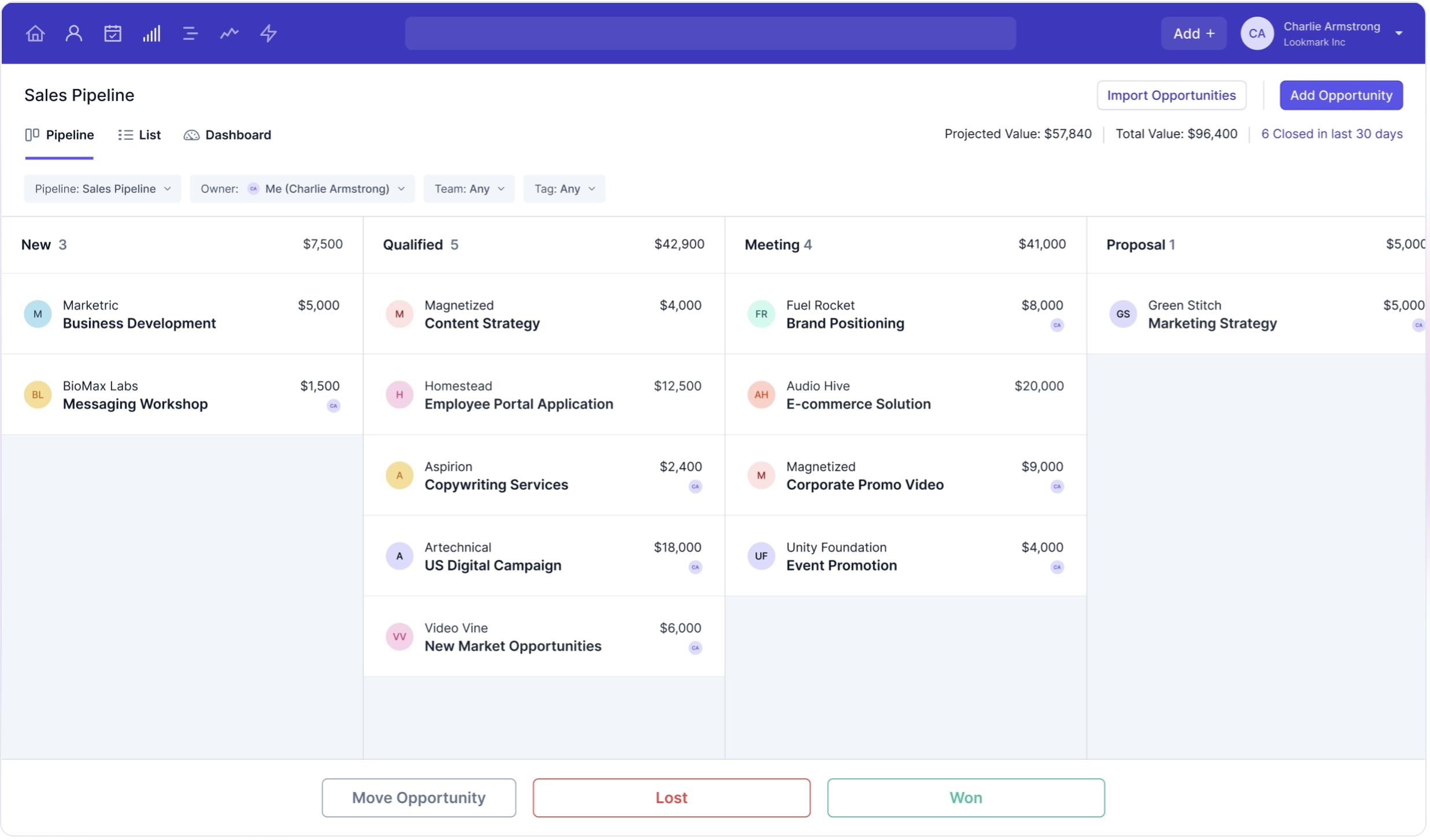
Key features
- Multiple sales pipelines for different team functions
- Project boards for team collaboration
- Customizable fields for team-specific data needs
- Contact management for up to 30,000 contacts
- Email templates for team consistency
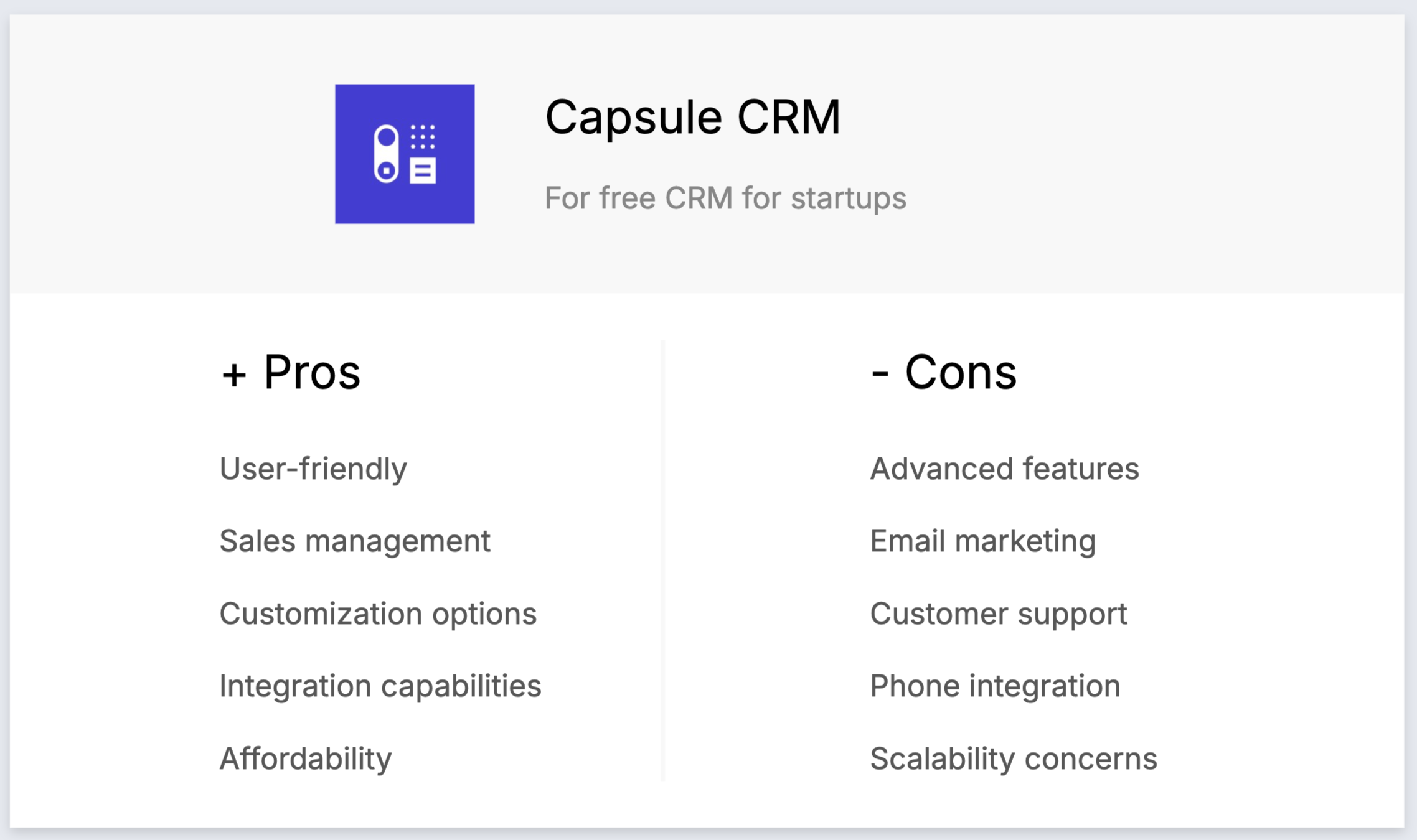
Pros
- Simple team adoption: Straightforward interface that teams can implement quickly without extensive training or complex setup processes.
- Reasonable team pricing: Cost-effective option for teams, especially those focused primarily on basic CRM functions.
- Good customization basics: Sufficient customization options for teams with straightforward processes and standard CRM needs.
- Solid integration options: Integrates well with common business tools that medium-sized teams typically use in their daily workflows.
- Team collaboration features: Project boards and shared pipelines provide basic collaboration capabilities suitable for smaller teams.
Cons
- Limited advanced team features: Lacks sophisticated automation, advanced analytics, and complex workflow management that larger teams typically need.
- Basic email marketing: Email capabilities are insufficient for teams needing comprehensive marketing automation or sophisticated nurture campaigns.
- Support limitations: Customer support is primarily email-based, which can be insufficient for teams needing immediate assistance with critical issues.
- No advanced communication features: Lacks built-in phone, SMS, or advanced social media management features that many teams require.
- Scalability concerns: Teams approaching 50 people often outgrow Capsule's capabilities and need to migrate to more robust platforms.
Price and plans
- Starter plan: $21 per user, per month ($420-1,050 monthly for teams of 20-50).
- Growth plan: $38 per user, per month ($760-1,900 monthly for teams of 20-50).
- Advanced plan: $60 per user, per month ($1,200-3,000 monthly for teams of 20-50).
- Ultimate plan: $75 per user, per month ($1,500-3,750 monthly for teams of 20-50).
Conclusion
Choosing the right CRM is critical for maintaining growth momentum while building scalable processes. Based on our analysis, folk CRM emerges as the clear winner for teams this size, offering the perfect balance of powerful features, team collaboration tools, and cost-effectiveness. While HubSpot provides comprehensive features, its pricing becomes prohibitive at scale. Zoho offers extensive customization but requires significant setup time. Pipedrive focuses well on sales but lacks broader team coordination features. Capsule CRM works for smaller teams but doesn't scale effectively. folk CRM stands out with its intuitive team collaboration, advanced automation, and pricing structure designed for growing organizations. To see how folk can transform your team's efficiency and coordination, start your free trial here.
👉🏼 Try folk now to evaluate it as one of the 5 best free CRMs for startups and never miss a follow-up
Need help finding the perfect CRM match for your team? Use our free tool to get personalized recommendations.
FAQ
What CRM is best for teams of 20–50 people?
For 20–50 users, prioritize collaboration, automation, permissions, and reporting. folk offers shared pipelines, email sequences, and LinkedIn outreach at team-friendly pricing, making it a strong fit.
How much should a 20–50 person team budget for a CRM?
Expect $400–$6,000/month based on seats and features. folk is typically $400–$2,000/month at this size; enterprise suites can exceed $9,000/month. Include integrations, training, and admin time in total cost.
How do you implement a CRM across a 20–50 person team?
Consolidate and clean data, standardize pipelines and handoffs, set role-based permissions, automate routine tasks, onboard in phases with internal champions, and track adoption with reports to iterate.
What is the best CRM for personal use?
For solo users, choose a simple personal CRM focused on contacts and tasks. For teams of 20–50, use a collaborative CRM with shared pipelines and automation, such as folk.
Discover folk CRM
Like the sales assistant your team never had


